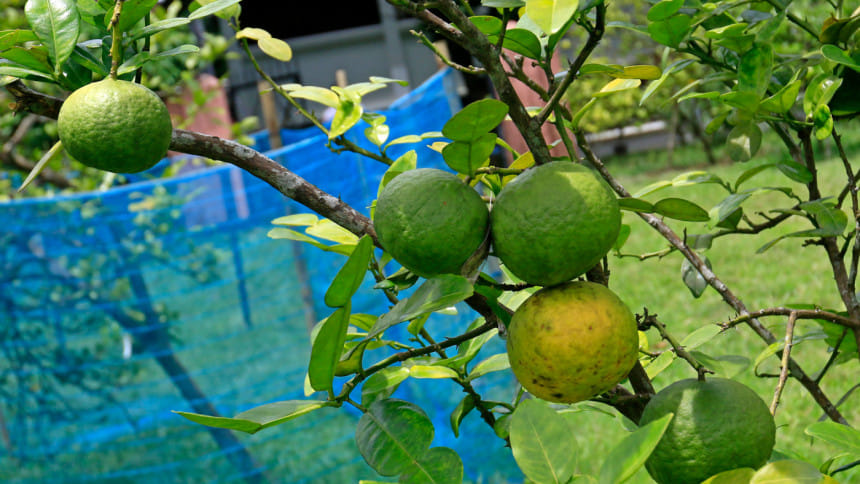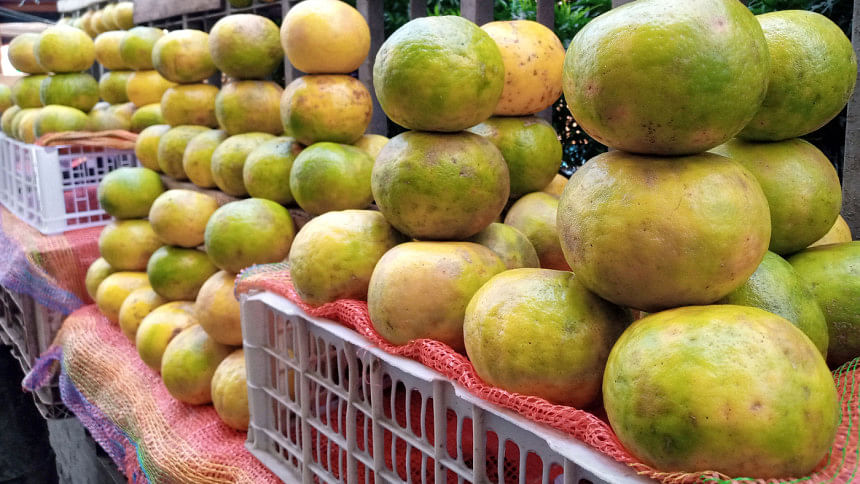Demand is there, production is not

While visiting Sylhet, one particular item in the kitchen markets always catch the attention of tourists -- a round-shaped lemon-like fruit.
This is "shatkora" -- a distinct citrus fruit that is native to hilly terrains of greater Sylhet and India's Assam and Meghalaya regions.
The fruit's thick peel gives it a savoury, tangy flavour when added to meat and fish curries, and in dal. People also make pickles out of it.
For centuries, greater Sylhet region's residents and adjacent Assam and Meghalaya provinces of India are much fond of the fruit.
Decades ago, shatkora production was so popular in Sylhet that a village in Moulvibazar's Barlekha upazila was named Shatkora Kandi.
However, over the years, production in Sylhet gradually declined -- so much so that even Shatkora Kandi has only a handful of the fruit-bearing trees now.
As a result, for decades, the growing demand is being fulfilled with imported shatkora from India's Assam and Meghalaya.
In 2013, Prof Mohammad Nesawar Miah, who got his PhD researching the fruit, named it "Citrus macroptera Montrouz var annamensis Tanaka".
The average height of the shatkora plant is 2 to 3 metres and width 2 to 4 metres. The fruit is about 6 to 10 cm in diameter.

A shatkora in Sylhet's local kitchen markets goes for around Tk 20 to 60 during peak season (between September and October). It costs even more during the early and late seasons.
Salek Ahmed, a shatkora seller from Bandarbazar area, said, "The demand grows when expatriates come to visit. Besides locals, tourists coming to Sylhet also buy them."
Saleh Ahmed Juwel, chairperson of Barlekha Sadar Union, said, "I heard from my parents that Shatkora Kandi village was famous for the fruit. But now only a handful of shatkora trees are available in some households."
Md Musharraf Hussain Khan, additional director of Department of Agricultural Extension in Sylhet division, said, "Shatkora used to be the pride of Sylhet, but now it is no longer produced commercially in the region."
"The varieties of this fruit is now exposed to many diseases due to climate change, and farmers lack the knowledge to manage the trees. It's time to develop a hybrid, climate-resilient variety," he said.
He said the local demand relies on imports, yet Bangladesh exports shatkora to many countries like the UK, US and UAE. In reality, they are exporting the imported fruits.
According to Customs, Excise and VAT Commissionerate in Sylhet, 1,078 tonnes of citrus fruits, mostly Shatkora, were imported from India through Sylhet border in fiscal 2021-22.
In the same fiscal, Bangladesh exported citrus worth USD 91,639, of which a large amount is shatkora, according to Export Promotion Bureau.
The Citrus Research Centre (CRC), a subsidiary of Bangladesh Agricultural Research Institute in Sylhet's Jaintiapur upazila, released a variety of this fruit -- "BARI Shatkora-1" -- in 2004.
MHM Borhannuddin Bhuyan, scientific officer at CRC, said shatkora is a very delicate fruit, and the tree grows slowly; that's the reason why farmers are losing interest in growing shatkora amid high demand.
He said CRC recently received advanced research equipment, and a hybrid shatkora variety is in the works.

 For all latest news, follow The Daily Star's Google News channel.
For all latest news, follow The Daily Star's Google News channel. 



Comments